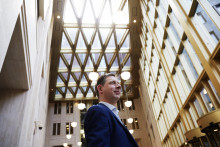‘Our task is to keep the Netherlands stable and safe. Enhancing the stability of the Dutch society in the digital domain is crucial for that, because digital means are essential for our society to keep running. Critical services like electricity or our financial systems need to keep working,’ says Rogier van Wanroij. ‘That is why we call ourselves the “digital firefighters”.’
If this UT graduate were in fact a fireman, visiting his workplace would probably be much easier. At a fire station you’d not need to undergo any registration, several ID checks and scans, all of which is necessary if you wish to get to Rogier van Wanroij’s office. And understandably so. After all, his office belongs to the National Coordinator for Security and Counterterrorism (NCTV), responsible for ensuring that the Netherlands remains safe.
Managing cyber attacks
‘I’m a Deputy Manager of Expertise and Advise at the National Cyber Security Center, which is part of the NCTV,’ specifies Van Wanroij. ‘The main objective of our department is to increase knowledge and awareness of cyber security. We keep track of current developments and threats, provide specific guidelines, give presentations and collaborate with many public and private partners, including universities and research institutes – University of Twente as well.’
This could sound as a ‘regular boring office job’, but the ministry employee assures me that it’s anything but. ‘This job is very fast paced and exciting. I never know what the week will bring,’ he describes. ‘We’re part of the crisis management infrastructure, which means we are tasked to manage major incidents. In particular, we coordinate cyber security incidents, such as the recent WannaCry ransomware attack. If an attack happens, we immediately have to contain it, assess the level of the threat, because it could damage the country’s critical infrastructure. Suddenly we could be without electricity or money.’
A growing threat
Could that happen? Should we be worried? ‘Yes, we should take these threats seriously. Professional criminals are becoming increasingly better organized and are using advanced digital attack methods. They are becoming a growing threat to the digital security in the Netherlands. Yet, if it comes to cyber security, there are many easy things everyone can do to protect themselves. Simple backups, for example,’ says Van Wanroij. ‘Everyone should pay attention to their cyber security and realize it will and should cost some money. We protect our physical possessions with locks on our doors, and so we should also protect our digital ones. Countermeasures are no guarantee you won’t have problems, but they help to deal with them.’

A board level issue
As the UT alumnus points out, cyber security should not be an afterthought: ‘It should be a board level issue and one of the main priorities in every organization. But getting this message across to the public is a challenge. It used to be viewed as a technical issue, something for the IT department, but the truth is that our entire society runs on digital means.’ That is why it’s vital to look out for any cyber security threats and inform organizations as well as the public. Because everybody is responsible for their own digital safety.
‘One of today’s biggest threats are professional cyber criminals,’ explains the expert. ‘They want to make money and they are very good at innovating their ‘business processes’. In fact, they are much faster at innovation than regular companies, as evidenced by the advancements in ransomware. Other cybersecurity dangers relate to state actors. Don’t underestimate the effects of cyber espionage. Digital attacks are nowadays used to influence democratic processes.’
Improving our society
Dealing with such criminal activity is very difficult though, because, as Rogier van Wanroij mentions, the world of cyber security is constantly changing. ‘Both problems and solutions in this domain are not clearly defined. It’s therefore challenging to bring everyone together and improve it. That makes my job complex, but also interesting. I’m very happy to work here with so many people, who are truly driven to improve society. It gives my life purpose.’
Improving our society was indeed the main reason why this Computer Science graduate began a career in the field of cyber security. ‘When I finished my studies in Twente, I realized I wanted to help make our society better,’ he says. ‘I’m proud of what our organization has accomplished in the past few years. We still need to do more, but we’ve changed people’s view on cyber security. I see that there has been a change for the better and I’m proud to be part of that change.’
You can also find this article in our latest Science & Technology Magazine - grab your printed copy or see the entire magazine online.









